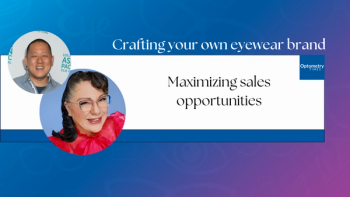
Editor’s choice for the most important stories of 2014
This past year brought us some very interesting stories. I couldn’t limit myself to only five choices, so I give you six of my favorite stories from 2014.
This past year brought us some very interesting stories. I couldn’t limit myself to only five choices, so I give you six of my favorite stories from 2014.
I’d love to hear your thoughts on what you liked-or didn’t like-about our 2014 coverage. E-mail me at
1. How to manage adenoviral conjunctivitis
NBC broadcaster Bob Costas was the hot topic of the 2014 Winter Olympics for all the wrong reasons. The anchorman developed a nasty, bilateral case of conjunctivitis in front of millions of viewers. Tammy Than, MS, OD, FAAO; Andrew Hartwick, OD, PhD, FAAO; Ellen Shorter, OD, FAAO; Spencer Johnson, OD; Blair Lonsberry, OD, MS; Med, FAAO; Mae Gordon, PhD; and Thomas Freddo, OD, PhD, FAAO, wrote a great piece inspired by Costas’ struggle on how to treat adenoviral conjunctivitis.
“Adenoviral conjunctivitis (Ad-CS) has never been so popular a topic as it is right now. With over 26 million viewers tuning in to watch the Olympics, Americans have watched Bob Costas’s unilateral conjunctivitis worsen, then become bilateral,” they wrote. “His ocular condition prompted many commentators to remark, ‘Can’t someone help him?’ Members of the RAPID (Reducing Adenoviral Patient-Infected Day) research group, along with many other optometrists, sat helplessly staring at our television screens, wishing we could send him a bottle of Betadine!”
Even if your patient isn’t suffering from the condition live on TV in front of millions, you’ll want to check out their tips for treating conjunctivitis.
2. Rapper’s wife receives controversial implant to change eye color
Wife of rapper T.I. and reality star Tameka “Tiny” Harris appeared on Good Morning America this fall to reveal she had undergone surgery in Africa to permanently change her brown eyes to “ice gray” using a controversial implant made by BrightOcular. We spoke with eyecare professionals about their thoughts on the safety of such a procedure and whether the implant could be a popular choice in the U.S. one day.
“People want a permanent fix. They don’t want to deal with contact lenses. The reality is that we live in a very vain society,” Optometry Times Editorial Advisory Board member Marc Bloomenstein, OD, FAAO, in Scottsdale, AZ, told us. “We think it’s outlandish because it’s so superficial. It’s just a cosmetic change. We look at it and think, ‘Do you really need to do that?’ But why not?”
3.
This story came to us from David Balto, an antitrust attorney who represents the Union of American Eye Care Providers. He says that the vision care industry as it stands today is bad for eyecare providers, laboratories, and patients.
“There is no question that certain vision care plans have dominated the eyecare market for the last two decades,” he writes. “As they have become dominant and integrated into new lines of business, they increasingly are coercing optometrists, ophthalmologists, independent laboratories, and consumers-the result higher prices, less choice, and reduced competition.”
Managed vision care and its effect on the eyecare industry has long been a hot topic, and this story created a lot of buzz with our readers.
4. The unintended consequences of optometric board certification
This editorial from our Chief Optometric Editor Ernie Bowling, OD, FAAO, NAP, was in response to an announcement from the National Board of Examiners in Optometry of its board certification entity.
“With the new NBEO-BC, we now have four-four!-board certification entities in our profession: the ABO (American Board of Optometry), the ABCO (American Board of Clinical Optometry), the ABCMO (American Board of Certification in Medical Optometry), and the new NBEO-BC,” Dr. Bowling writes. “A veritable alphabet soup of board certification organizations now exists for optometry where none had existed just five short years ago.”
5.
Our local tech junkie, Justin Bazan, OD, shared his tips for responding to a negative review of your practice on websites such as Yelp.
“The truth is there really isn't such a thing as a negative review,” Dr. Bazan writes. “Every review you get is merely an opportunity to let the world know where you stand and how you do things. Often, this is just way more apparent with the one-star reviews. The more people sharing their experiences, the better, and the more people reading your replies, the better. In a world where people are online doing their research, you want to have a strong presence, and you want people to be able to know what experience you are going to provide them.”
Some of our readers didn’t quite agree with or understand Dr. Bazan’s Brooklyn-style approach to dealing with the online haters. What do you think? Check out the story and decide for yourself.
6. Experiencing a retinal detachment as an OD
In this piece, Michael Brown, OD, FAAO, shared the story of experiencing a retinal detachment as an optometrist while thousands of miles away from his home in Alabama. Dr. Brown shared his experience from the other side of the chair-from the feelings of initial dread at the first signs of the retinal detachment to his struggle to comply completely with his face-down time.
“‘You’re not going to be able to travel for several weeks,’ he said. I held my head in my hands as a vision of all the work that I ‘needed’ to do back home flashed before me,” Dr. Brown writes. “The fellow was young and still searching for the right words of comfort to match his prodigious surgical skills, but in the long pause that followed, he reached down deep and found them. ‘Dr. Brown,’ he said, ‘you’ve spent your life taking care of others, and now it’s time to let someone else take care of you.’”
Newsletter
Want more insights like this? Subscribe to Optometry Times and get clinical pearls and practice tips delivered straight to your inbox.













































